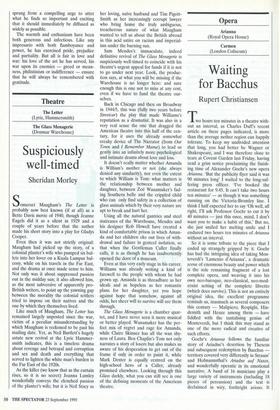Theatre
The Letter (Lyric, Hammersmith) The Glass Menagerie (Donmar Warehouse)
Suspiciously well-timed
Sheridan Morley
Somerset Maugham's The Letter is probably now best known (if at all) as a Bette Davis movie of 1940, though Jeanne Eagels did it as a silent in 1929 and a couple of years before that the author made his short story into a play for Gladys Cooper.
Even then it was not strictly original: Maugham had picked up the story, of a colonial planter's wife who pumped six bul- lets into her lover on a Kuala Lumpur bal- cony, while on his travels in the Far East, and the drama at once made sense to him. Not only was it about suppressed passion out in the midday sun; it also allowed him, as the most subversive of apparently pro- British writers, to point up the yawning gap between the morality the colonial settlers tried to impose on their natives and the one by which they themselves lived.
Like much of Maugham, The Letter has remained largely unposted since the war, victim of a peculiar misunderstanding by which Maugham is reckoned to be past his mailing date. Yet, as Neil Bartlett's hugely astute new revival at the Lyric Hammer- smith indicates, this is a timeless drama about revenge and betrayal and corruption and sex and death and everything that served to lighten the white man's burden in the Far East of the 1920s.
As the killer (we know that as the curtain rises, so it is no secret) Joanna Lumley wonderfully conveys the clenched passion of the planter's wife; but it is Neil Stacy as her loving, naive husband and Tim Pigott- Smith as her increasingly corrupt lawyer who bring home the truly ambiguous, treacherous nature of what Maugham wanted to tell us about the British abroad in this acid satire on racism and imperial- ism under the burning sun.
Sam Mendes's immaculate, indeed definitive revival of The Glass Menagerie is suspiciously well-timed to coincide with his theatre's urgent appeal for funds if it is not to go under next year. Look, the produc- tion says, at what you will be missing if the Warehouse is no longer here: and sure enough this is one not to miss at any cost, even if we have to fund the theatre our- selves.
Back in Chicago and then on Broadway in 1944/5, this was (fully two years before Streetcar) the play that made Williams's reputation as a dramatist. It was also in a very real sense the one that dragged the American theatre into this half of the cen- tury, for it uses the already somewhat creaky device of The Narrator (from Our Town and I Remember Mama) to lead us gently into an infinitely more psychological and intimate drama about love and loss.
It doesn't really matter whether Amanda is William's mother or not (she always denied any similarity), nor even the extent to which William is Tom: what matters is the relationship between mother and daughter, between Zoe Wanamaker's fad- ing Southern belle and the crippled child who can only find safety in a collection of glass animals which by their very nature are apt to break and hurt her.
Using all the natural gantries and steel staircases of the Warehouse, Mendes and his designer Rob Howell have created a kind of comfortable prison in which Aman- da and her children eke out lives of with- drawal and failure in genteel isolation, so that when the Gentleman Caller finally calls, it is as though he has inadvertently opened the door of a museum.
Even at this very early stage in his career, Williams was already writing a kind of farewell to the people with whom he had grown up. Amanda is as threadbare as her ideals and as hopeless as her romantic plans for her daughter, yet you hope against hope that somehow, against all odds, her sheer will to survive will see them through.
The Glass Menagerie is a chamber quar- tet, and I have never seen it more musical or better played. Wanamaker has the per- fect mix of regret and rage for Amanda, while Claire Skinner has all the wan shy- ness of Laura. Ben Chaplin's Tom not only narrates a story of losers but also makes us aware of his desperation to get out of the frame if only in order to paint it, while Mark Dexter is equally centred on the high-school hero of a Caller, already promised elsewhere. Looking through this Glass darkly, what you can still see is one of the defining moments of the American theatre.


































































 Previous page
Previous page